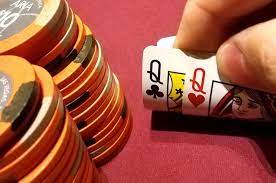So, you think you could use a little strategy to help you improve your game, and you think that a poker tournament expert showdown can help you do just that. Unbelievably, during the 2006 World Series of Poker Greg Raymer was captivated by this idea, and he actually used the showdown format to improve his poker game.
90% of people who enter a poker tournament lose money. Just 3% will actually make money. Yet, the vast majority of players think they are going to win because they buy in to a tournament with a buy-in of $2,500, $5,000, $10,000, and in the case of the World Series of Poker, a Hasbro tournament. Everyone knows that not one of these is likely to be profitable. In fact, only the top 10% of players make any money at the World Series of Poker. So, if you are going to try and win a poker tournament, here is what you need to know:
- The World Series of Poker is not a real tournament. It is a Pengeluaran Hk 6d
The way they teach poker tournaments, there is a distinct difference between a home game and a tournament. In the latter case, players gradually increase their buy-ins through a season, and the goal is to finish on the final table where all the loot is at stake. Consequently, a lot of experts will tell you that tournaments are the best way to make a stable income early on in poker’s development.
These are simply misunderstandings. The truth is that tournaments involve a multitude of factors that are out of your control, at least until the blinds eventually rise above your betting level. Factors include the number of players, the skill of the players, the time of day, weather, and health of the players involved.
Tournaments are also entered by many inexperienced players, who may well be prepared to lose money. Your poker tournament strategy will be completely different if you have never played in a tournament.
- You won’t win a tournament in a single hand.
In the days of yesterdays, the probability of winning a single hand in a tournament was one of 10 in 100 hands. As the blinds increased, the probability diminished. Now it is less than 1% and sometimes even less than 1%.
In addition, when you play a tournament, there is almost always a period of time during which you will lose money. This is simply part of the game.
- “It doesn’t matter how much money I bring to the table if I’m a bad player.”
stereo whatever your skill level, you will need to start small and build your way up. If you try to take on too many opponents at once, you will likely lose money and your stack will shrink.
If you are just starting out in poker, even if you have been playing well, you need to start small.
- You can’t win a tournament in a single hand.
Ok, so you are doing great at one table in a $1 tournament, and then you take a shot at a nickel tournament. After all, a nickel tournament has only 2 players and a minimum bet, and you feel that you can beat the heads up odds that you are getting. But you can’t because the minimum bet in a nickel tournament is usually ten times the amount of the small blind. You’d have to lose 40 big blinds to win one big blind. Although you may win some hands, you would have to eventually lose most of your hands to catch up and that is not going to happen.
- “I’ve been winning the $1 tournaments.”
Are you really keeping track of the tournaments that you play? Take note of the dollar values of the tournament chips you use. If you buy into a tournament with $20 chips, but end up with $200 in chips, then you have doubled your money. So keep track of how many tournaments you have won and beat.
- “I can’t wait for the big money; I’ll only have time left.”
itter favoritism, this attitude is actually quite common. Instead of building upon a current strategy or winning a tournament with a different approach, players want to be moving all-in as soon as the hand is made. The problem with this is that you don’t have enough chips to make it a profitable play. Instead of winning an all-in bet, you will probably lose. If you have a problem with this, wait until a ten-valued card is dealt and make your move.
- “Oh, I’ll call with my draw.”
Technically, this isn’t gambling, but it is a common enough attitude and a wrong mindset for sure. You are cutting the odds of winning smaller pots by doing so. Always be patient; draws will come.
